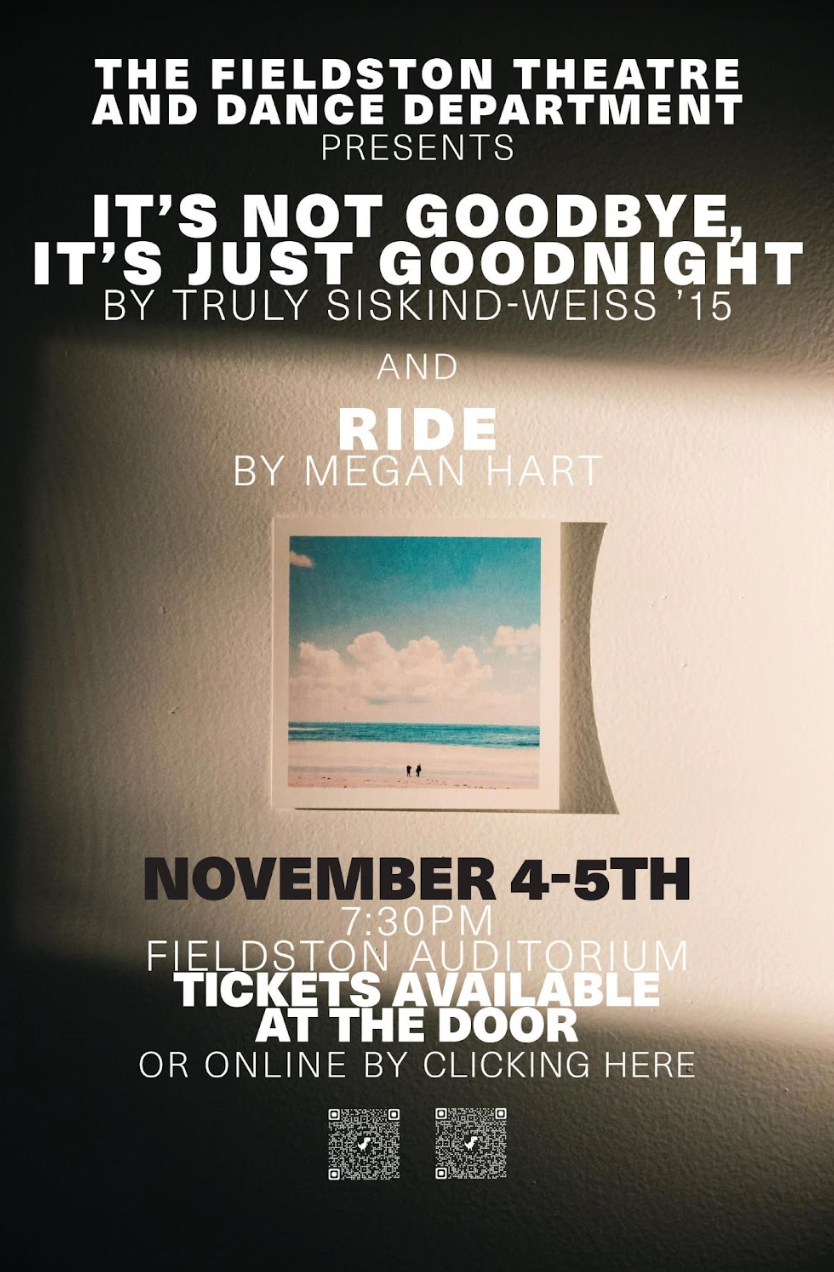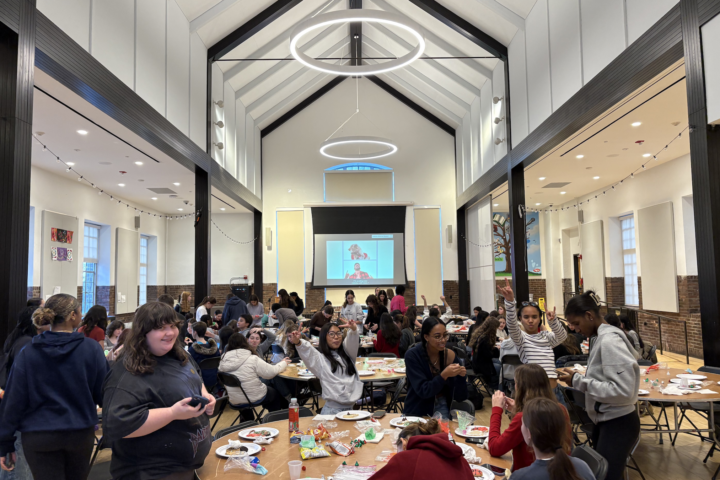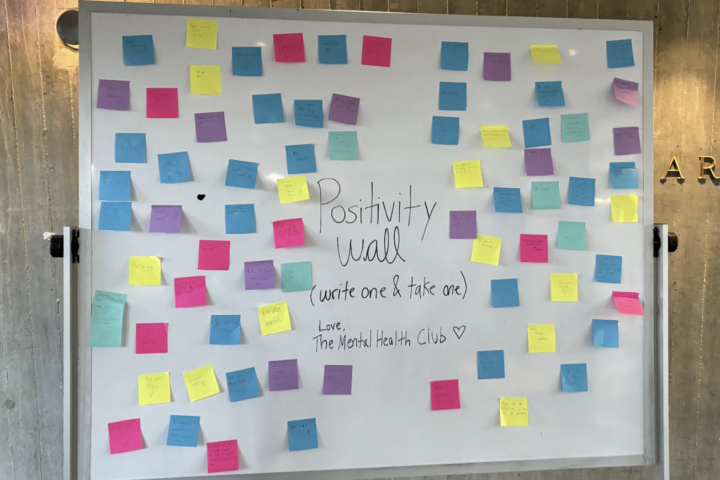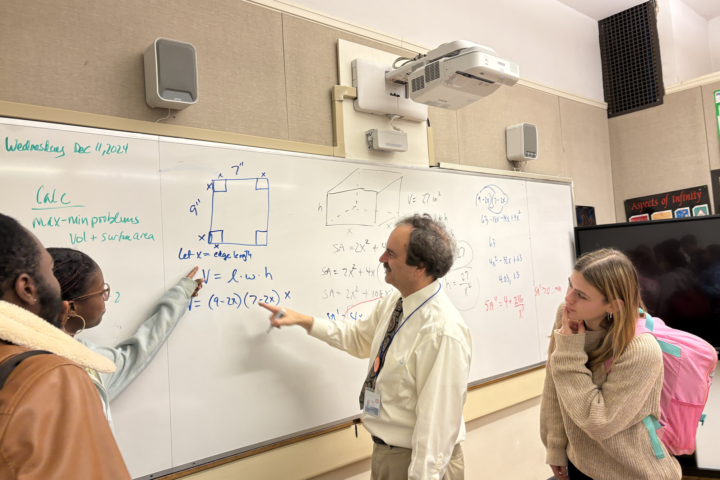On my last night of camp, one of my friends leaned on my shoulder and confided in me that leaving camp was like being “left alone at the end of the world.” Those words have stuck with me for years in part because they were some of the last I ever heard from her (we did not keep in touch, despite everything) but also because of their absurdity. It’s summer camp. Life goes on for ten other months of the year. If she’d said that about the end of camp during one of those other months, I might have laughed and thought her immature, but in the cold Maine night, I just agreed. It’s Not Goodbye, It’s Just Goodnight and Ride capture that same feeling of a small apocalypse–the end of a summer-camp friendship, or the last spin class before a pandemic.
It’s Not Goodbye, It’s Just Goodnight is an emotional tour de force centering the complex relationship between Maggie (Susie Hunt) and Sarah (Ari Laureano Medina). Maggie becomes enamored with Sarah, while Sarah crushes on Eli (Star Blakney). While a summer camp crush seems like a juvenile setup, the actors treat every emotion with true sincerity, allowing the audience to believe that there’s no such thing as undeserved emotion. The rest of the cast echoes this sincerity. Chloe Jean as mean girl Kelsey holds the power and charisma of a politician onstage, which makes her breaking point towards the play’s middle all the more heart wrenching. Noa Saviano’s Bridget captures the tragedy of being on the edge of the in-group. Alex Taube is truly menacing during the ghost story and nightmare scenes, and plays preteen perfectly. Throughout the show, the characters brush up against adulthood, but still constantly try to distance themselves from it. When Taube’s Cami steals a beer bottle and the counselors find it, nobody wants to claim their involvement. When Kelsey gets her period, she doesn’t stop sobbing for the rest of the scene. When Maggie confronts Sarah while she’s on a date with Eli, asking about the magic they supposedly share, Sarah pushes away, saying, “you know it’s not real, right?” At intermission, I heard a parent complain (that isn’t uncommon to hear regarding Fieldston shows) that it was too “adult.” If I were one of the actors, I would take that as a compliment. They managed to take a show centering something so firmly preteen and make it into something dramatic, weighty and “adult.”
During intermission, the stage was transformed. The base setup stayed the same, but the beds were replaced with spin bikes, the trees with plastic panels and the soft lighting broken by the descent of harsh fluorescents. Before our eyes, a summer camp became a gym. Emmie Finckel’s stage design truly never misses. A handful of audience members went downstairs to enjoy the concession stand and watch a video outlining the rehearsal process, featuring the plays’ authors–Fieldston alumnus Truly Siskind-Weiss (‘15) and Megan Hart (author of Fieldston’s 2019 fall drama, Can’t Stop/Won’t Stop). When the lights went down, audience members were called back to the auditorium by assistant director Nate Russo for the second show to begin.
In an immediate tone shift, the actors stumbled onstage in bright, multicolored outfits, tired from their workout. They comment on how something seemed off about their class. The instructor is never seen onstage–they quit before the next spin class, leaving no notice. The class goers, prompted by an emotional speech from Nicole (Ari Laureano Medina), lead themselves through one final workout. The rest of Ride carries the audience throughout a journey of connection, emotion and learning to let go. Clem Schonfeld’s Cy is especially a powerhouse of dry comedy, taking characters down a peg when they need it. Star Blakney adds to the comedic palette as Jeremy, a former athlete who continuously claims he was way more fit before he tore his ACL and ends the show with a frankly hilarious rendition of Drake’s “Hotline Bling.” Despite the more generally comedic tone, Ride is rife with emotional speeches, all delivered to perfection–from Nicole’s desperate pleading with the class to Susie Hunt’s Juliet screaming about how the stress balls her mom sent her don’t really fix anything important. The play takes place on the precipice of the pandemic–other gyms are closing down, one character carries a mask with her (but doesn’t wear it). The sense of finality is as present as the click track (composed by Davis Luengthada) in the background. Perhaps this is why the ending has so much impact. The characters sing different songs in unison–together, each bringing their unique personality into the community. They’re all from different backgrounds and in different grades, none of them seeing the others outside the course. One of the characters, Raina (Chloe Jean), isn’t even enrolled in the college that hosts the spin class. They know this is the last time they’ll probably ever see each other. And what do they do about it? They sing.
The shows seem entirely disparate at first glance. What does a summer camp have to do with a college spin class? But the real connection is watching something end, and how people deal with it. In It’s Not Goodbye, we watch a relationship begin, progress and then–abruptly–end. There’s a distinct moment where the audience and characters begin to see that end coming. Each character reacts differently. Sarah tries to pretend that the relationship never happened in the first place. Maggie tries to ensure that the end is over quickly. Yet both have trouble simply letting things go. They don’t say goodbye, but goodnight–holding out hope that maybe this ending isn’t final. In Ride, the ending is present throughout. The characters use it as a means to end other things in their lives. In one scene, Raina suggests that everyone stop their bike and say goodbye to whatever emotional baggage they’re carrying with them. We don’t get to see what this baggage is, but the characters seem jubilant–Cy kisses his hands and Jess (Alex Taube) violently pushes something we can’t see off the back of her bike with a grin. Juliet, though, has trouble letting go. Susie Hunt essentially plays the same character in both shows; someone younger, more naive than the rest of the cast–easily attached and not very sure of herself. The connection becomes even more apparent when Juliet doesn’t say goodbye–instead whispering that she’ll see her baggage on the other side. The twin shows demonstrate that endings aren’t final. You can always meet up with someone on the other side.







Thanks for this lovely feedback! So excellently written, reads like a professional play review.